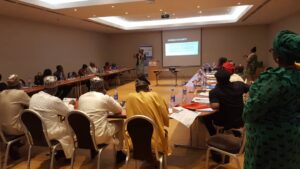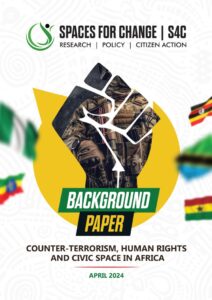Strengthening cooperation and coordination between the legislature and civil society organizations (CSOs) was the theme of the just-concluded joint retreat for the Senate Committee on Diaspora and NGOs and the House of Representatives’ Committee on CSOs and Development Partners held in Lagos. At the retreat attended by senators, honourable members of the respective committees of the National Assembly and civil society stakeholders, Spaces for Change | S4C’s presentation provided detailed guidance on how to align the litany of statutory regulations for nonprofits with Nigeria’s binding international obligations spelt out in standard-setting frameworks like the Financial Action Task Force (FATF).
S4C’s presentation on Statutory Regulations for CSOs and Challenges of Legislative Engagement chronicled the persistent attempts by the Nigerian government and governments around the world to regulate non-governmental organizations (NGOs) and restrict their operations under the guise of national security. These attempts are usually triggered by the norms and obligations set out in international financial regulations like FATF Standards. In the name of complying with these international obligations, national laws designed to combat money laundering and counter the financing of terrorism (AML/CFT) have been worded so broadly and applied uniformly to the entire nonprofit sector, despite the insufficiency of evidence of such risks in the sector. These laws impose stringent reporting requirements on NGOs, multiple registration controls, onerous compliance obligations and overlapping regulatory controls by diverse government entities, resulting in significant disruptions in their humanitarian and charitable operations. A recent report, HARMS FROM ABROAD: IMPACT OF GLOBAL SECURITY MEASURES ON CIVIC SPACE IN NIGERIA, by the Action Group on Free Civic Space, which S4C co-authored, analysed how the incorrect application of global security standards set out in international legal frameworks is shrinking the civic space and negatively affecting the operations of nonprofits in the national context. The incorrect transplantation of global norms without contextual nuances impedes rather than enhances the work of CSOs.
Thankfully, Nigeria is gradually moving towards reversing this climate of excessive restrictions on non-profit activities. In recognition of the ongoing positive change, S4C commended the Nigerian government for the delisting of NPOs as designated non-financial businesses and institutions (DNFBIs) according to the newly-minted Money Laundering (Prohibition) Act. She also commended the ongoing NPO Risk Assessment(NRA) by the federal government through the Economic Financial Crimes Commission (EFCC) led by the Special Control Unit against Money Laundering. The NRA which was previously conducted in 2016 allowed the broad misapplication of global AML/CFT regimes to all NPOs in the sector without identifying their individual risk exposure. It is hoped that the ongoing NRA will correct these gaps in non-profit regulation.
The presentation was followed by a robust discussion between lawmakers and civil society leaders about some of the country-specific AML/CFT obligations, coordination of agency responsibilities, legislative amendments to existing laws and the future of collaboration between the National Assembly and civil society. Lawmakers expressed deep appreciation for the updates regarding the country’s AML/CFT efforts and the current steps towards harmonizing national security measures with international obligations. Other recommendations agreed upon at the meeting include improving the classification of non-profit organizations (NPOs) operating in the country, the inclusion of NPOs in the law-making processes and the total removal of unnecessary restrictions on charitable activities.
Days after the retreat, the House of Representatives stepped down the second reading of a bill to establish the Non-Governmental and Civil Society Organisations Agency for the promotion of social development activities in Nigeria (HB 2044), sponsored by Hon. Sada Soli (APC: Katsina). The Bill was stepped down due to a lack of clarity with regard to its intent.
The retreat, organized by the Policy and Legal Advocacy Centre (PLAC), under the Strengthening National Assembly Programme (SNAP), was conceptualized by the National Democratic Institute (NDI) to improve the working relationship between the legislature and the civil society sector. As Nigeria moves forward in an election season, it was imperative to ensure that national laws relating to civil society are brought in harmony with international best practices. The retreat took place on the 22nd of July and was organized by PLAC with the support of European Union Agents for Citizen Driven Transformation (EU-ACT) and the British Council.





















